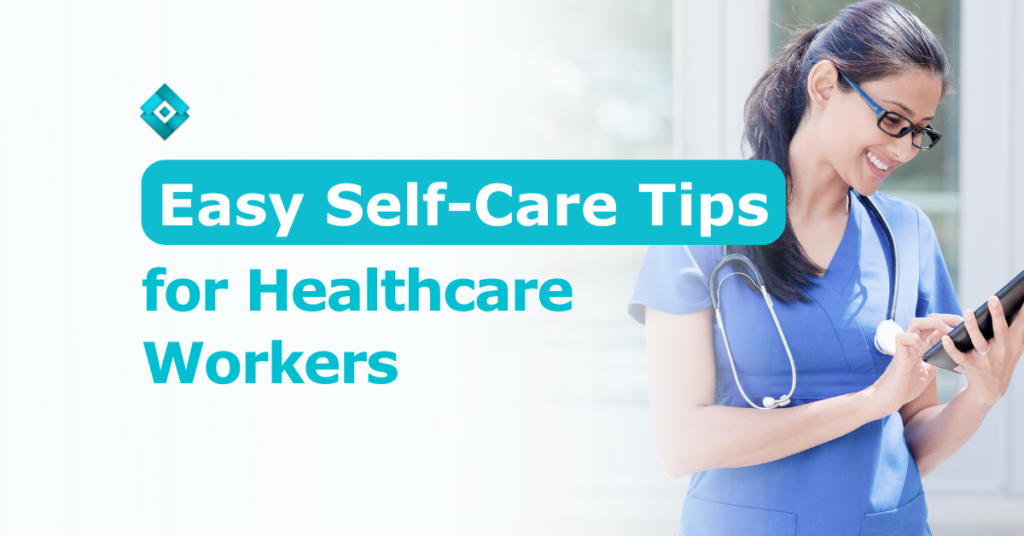Why is taking care of yourself essential, especially today?
Since the medical industry is growing busier, self-care tips for healthcare workers might get lost in the way. Truly, as a healthcare worker, you understand the importance of taking care of others. But it’s just as important to take care of yourself. Healthcare workers are some of the most selfless people in the world. They dedicate their lives to caring for others, often at the expense of their health and well-being. However, it is important to remember that self-care is not selfish but essential for maintaining physical and mental health. Ultimately, healthcare workers who take care of themselves are better able to take care of their patients.
Further, self-care is crucial during times of stress, such as the COVID-19 pandemic. By taking care of yourself, it will better equip you to handle the challenges of your job. Remember, don’t just care for the patient; care for yourself too.
Here are self-care tips for healthcare workers to incorporate into your daily life.
1. Recognize the valuable role you and your colleagues play on the front lines.
It’s no secret that being a healthcare worker can be challenging. The long hours, the stress of making life-or-death decisions, and the constant exposure to illness can take a toll on even the most dedicated professionals. Thus, recognizing the valuable role you and your colleagues play on the front lines is an integral part of self-care tips for healthcare workers.
It can be easy to get caught up in the day-to-day grind and forget that what you’re doing is important and makes a difference in the lives of others. Consequently, taking a moment to pause and reflect on the difference you’re making can help renew your sense of purpose and motivation.
Further, it can help remind you why you chose this career in the first place. So, next time you’re feeling overwhelmed or burnt out, take a moment to remember the difference you’re making. It just might be the self-care boost you need to keep going.
2. Step away from your work for a bit.
One of the best self-care activities you can do is step away from your work. For example, you can just walk around outside and take a deep breath. Don’t bring any work with you. Just allow yourself to rest your eyes. You can look at scenery near you or just simply close your eyes.
In addition, you may work out during your break. Exercise helps to reduce stress, improve sleep, and boost energy levels. And it doesn’t have to be strenuous – even a simple walk around the block can make a big difference. So make time for exercise, and your body will thank you.
3. Don’t isolate yourself.
In times of stress, stay connected with your friends and loved ones. Certainly, it can be easy to feel isolated when you’re working long hours, but staying engaged can help reduce stress and anxiety. Accordingly, stay in touch via text, social media, or video chat. For example, it can be just a simple hello or a little chat to ask how they’re doing. Certainly, these small acts go a long way in incorporating these simple self-care tips for healthcare workers.
4. Talk to yourself like you would talk to your patient.
As a healthcare worker, you will likely experience many emotions daily. From the joy of helping a patient recover to the sadness of losing a patient, it is essential to care for yourself emotionally and physically. One way to do this is by practicing self-compassion.
Significantly, self-compassion goes a step further by helping you to talk kindly to yourself. Hence, talk to yourself like you would carefully speak to your patient. It’s important to treat yourself with the same kindness and compassion that you would show to others.
5. Schedule your self-care.
Just like you schedule a time to take medicine, try to set a time or day for yourself, too, where you can just relax. To illustrate, it can be helpful to block out time in your calendar or set a daily reminder on your phone. Then, use that time to do something that makes you happy and helps you relax. It could be something as simple as reading a book, taking a walk outside, or taking a yoga class. Whatever it is, make sure it’s something you enjoy and makes you feel good.
6. Talk to your staff members.
Whether you’re sharing self-care tips or simply checking in on each other, taking the time to bond with your colleagues can help reduce stress and promote a sense of community. Notably, building positive relationships with your colleagues can help reduce stress, improve communication, and make the workplace more enjoyable.
When you feel connected to your team, you’ll be more likely to feel supported and appreciated, contributing to your overall well-being. So try to get to know your staff members and build strong relationships with them. It’s one of the best things you can do for yourself and your patients.
7. Seek professional help.
You often tell your patients to always consult their doctors before doing something because they are experts in their field. And they know to better deal with illness. It’s the same when you feel persistent sadness, anxiety, or other overwhelming emotions.
It’s nice to know all these self-care tips for healthcare workers, but if you feel like you need more support, don’t hesitate to reach out to a therapist or counselor.
Look for a remote team who’ll support you.
It is important to take care of yourself to continue delivering the best quality care possible. One way to do this is to delegate some of your tasks to a remote team. A remote team can support and help with scheduling, patient communications, and billing tasks. This can free up your time so that you can focus on taking care of yourself.
It’s not challenging to look for a quality remote team. Core Virtual Solutions provides trusted Virtual Assistants (VAs) and Virtual Medical Assistants (VMAs) to whom you can delegate tasks. Know more about them in a free discovery call with our industry experts!








